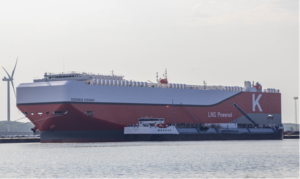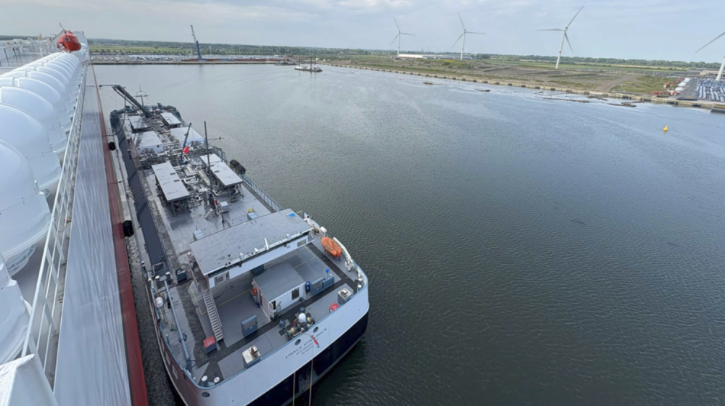K Line’s Oceanus Highway car carrier has made the first sailing with bio-LNG fuel supplied by Shell Western. The vessel received 500 tons of bio-LNG from Shell at the Belgian port of Zeebrugge.
Fueling net zero
According to the company, the liquefied bio methane (LBM) fuel, derived from renewable organic waste and residue, is ISCC-EU certified to have a carbon intensity of less than zero on a lifecycle basis, from fuel production to consumption.

In K Line’s action plan for GHG reduction, named Environmental Vision 2050: Blue Seas for the Future, the company has set a 2030 interim target of improving CO2 emission efficiency by 50% from 2008, surpassing the IMO target of a 40% improvement. Furthermore, it has set a new target for 2050: net zero GHG emissions. The company plans to continue introducing new low environmental-impact fuels, to tackle the challenge of achieving its targets.
Renewable partnership
Dexter Belmar, vice president of Shell Downstream LNG, commented, “Bio-LNG is a scalable solution we can use today. It is great for Shell to collaborate with key shipping players like K Line that are taking the lead in the adoption of bio-LNG. Together, we’re helping to build industry-wide momentum in the transition to renewable fuels. Bio-LNG’s increasing availability and commercial viability gives our customers confidence that their dual-fuel LNG fleets are ready to further reduce emissions.”
Hiroto Arai, general manager of the K Line environmental/technical strategy group, said, “Our goal is to achieve net zero GHG emissions by 2050, and reducing greenhouse gas emissions in maritime transportation is one of our top priorities. Our beginning to use bio-LNG fuel is a significant step toward our net zero GHG emissions goal. Additionally, we feel that our partnership with Shell, a leading global energy company, puts us in a position where we will be able to substantially impact the shipping industry’s transition to renewable fuels. We will continue to work diligently on the introduction of renewable fuels to achieve net zero GHG emissions by 2050.”
In related news, Daito Corporation (Daito), a subsidiary of Kawasaki Kisen Kaisha (K Line), recently signed a collaboration agreement with Kawasaki Heavy Industries (KHI) to build an electric tugboat.



